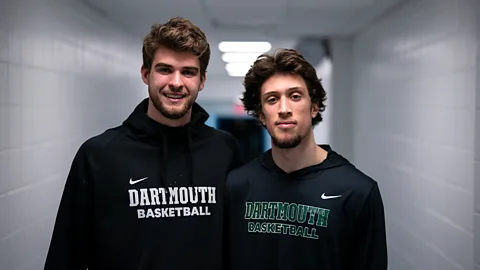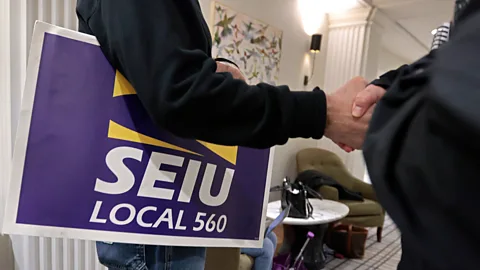Dartmouth's men's basketball team voted to unionise. The timing is just right
 Getty Images
Getty ImagesAs US organised labour participation reaches record highs, athletes at an Ivy League institution are joining in.
A year of record labour activity around the world – particularly in the US – has spread into industries that haven't been disrupted by collective action for years, if ever. The focus on workers' rights has continued beyond 2023's "summer of strikes" – and now landed at a small Ivy League school in New Hampshire.
On 5 March, the men's basketball team at Dartmouth College voted 13-to-2 to unionise. For members of the team, it means that they can collectively negotiate with the private institution to advocate for improvements they seek, largely around healthcare and pay. The move is unprecedented in collegiate sports, which has not seen attempted union action in nearly a decade – and has never found success. The players are now represented by Service Employees International Union (SEIU) Local 560, a union that advocates for many workers at Dartmouth.
"Today is a big day for our team. We stuck together all season and won this election. It is self-evident that we, as students, can also be both campus workers and union members," said Cade Haskins and Romeo Mythril, two players on Dartmouth's team, in a joint statement released by SEIU, shortly after the vote. "Over the next few months, we will continue to talk to other athletes at Dartmouth and throughout the Ivy League about forming unions and working together to advocate for athletes' rights and well-being."
In a scant few cases, US student-athletes have attempted to unionise in the past. The most notable instance was in 2015, when American football players at Northwestern University in Illinois attempted to unionise – which the National Labor Relations Board (NLRB) ultimately rejected due to the fact that Northwestern, a private institution, plays in a sports conference with public universities. What makes the Dartmouth basketball case different, however, is that an NLRB regional director determined that college basketball players at a private university are, in fact, employees like any others, and thus can unionise under the National Labor Rights Act (NLRA).
 Getty Images
Getty ImagesWhile the Dartmouth men's basketball team's vote to unionise is a relatively small collective action on its own, it takes place against a backdrop of increasing union and organised labour action. In the US alone, there were more than 450 strikes in 2023, according to data from the Cornell-ILR Labor Action Tracker, which keeps tabs on worker strikes across economic sectors. And while only 10% of workers in the US are union members, organised labour is rising in popularity and power. More than two-thirds of Americans approve of labour unions, according to a 2023 Gallup poll, up from less than half in 2009. Gen Z – including the majority of college-aged students – are particularly pro-union.
"There's much stronger support for unions and collective bargaining than there was 10 years ago, especially around younger workers," says Harry Katz, the Jack Sheinkman Professor of Collective Bargaining at the School of Industrial and Labor Relations at Cornell University, and president of the International Labor and Employment Relations Association (ILERA).
Alongside increased union interest in general, the Dartmouth team's move is taking place amid major changes to US collegiate athletics. A 2021 Supreme Court decision changed rules around "name, image and likeness (NIL)" policies, which now enable student-athletes to earn money through sponsorship contracts and similar means, where previously they were banned from doing so by the National Collegiate Athletic Association (NCAA).
For Dartmouth's men's basketball team, the vote may have been successful – but bargaining isn't necessarily a given. Leaders at the university are pushing back. According to a statement from the university, issued the same day as the successful vote, "The students on the men's basketball team are not in any way employed by Dartmouth. For Ivy League students who are varsity athletes, academics are of primary importance, and athletic pursuit is part of the educational experience. Classifying these students as employees simply because they play basketball is as unprecedented as it is inaccurate. We, therefore, do not believe unionization is appropriate."
A representative from Dartmouth tells the BBC that the university is filing a "request for review" of the regional NLRB's decision – which means that the national NLRB will weigh in with a final determination as to whether the basketball players are, in fact, employees. The response from the school was "surprising", says Chris Peck, SEIU Local 560's President. "There's been a lot of organising across the campus in the past few years – but this one? They're fighting it tooth and nail."
More like this:
With a union-friendly administration in the White House, some experts anticipate that the NLRB will ultimately side with student-athletes when weighing Dartmouth's appeal. "The current board is very sympathetic to unions," says Katz. "We have a decision from the regional NLRB that says they're employees and covered by the National Labor Rights Act (NLRA) – I think the national board will support it," he says. He adds the case may eventually reach the Supreme Court.
Yet whether the players' push succeeds, the historic vote sends a clear signal to other student-athletes around the country – and may even mobilise workers in other industries whose workplaces may not have historically been linked to collective action.
"It's absolutely the perfect time" for the players to unionise, says Peck. "I think this is the first step in organising athletes. The next step is taking it national."
